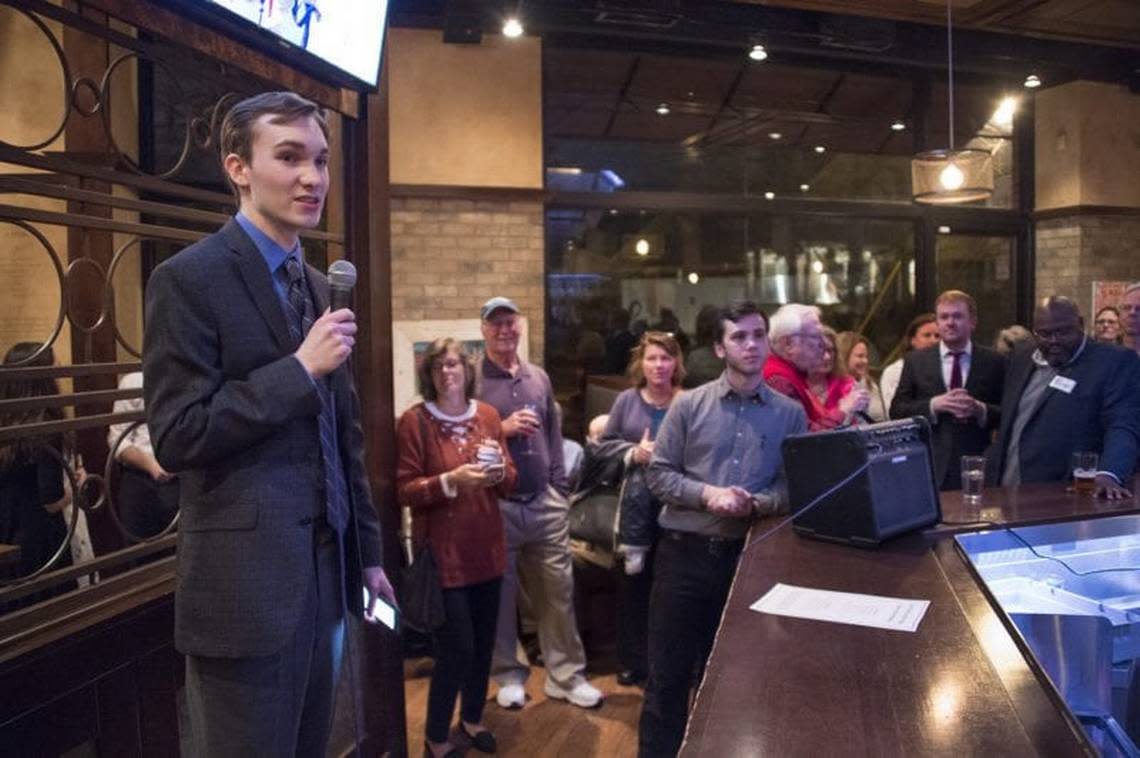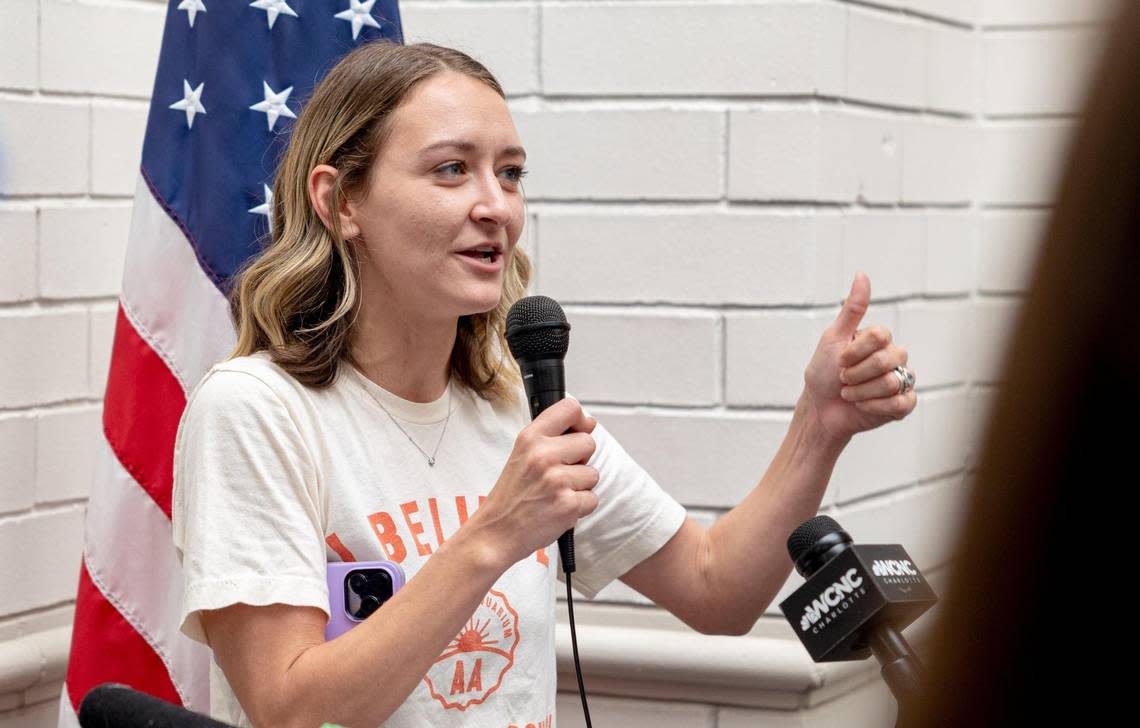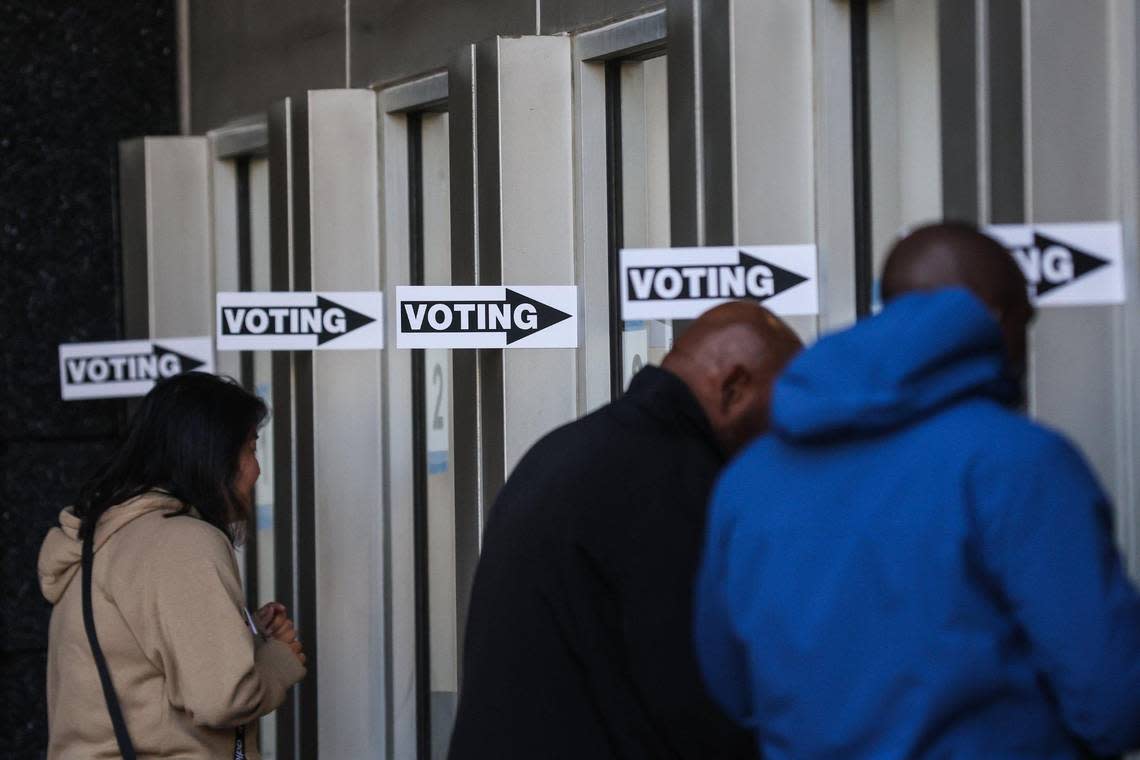Drew Kromer wants to ‘severely cripple’ GOP’s chances in NC. Here’s how he’ll do it
Drew Kromer believes the path to a blue North Carolina lies in duplicating success that prompted him to buy 100 wine glasses as a Davidson College student.
Kromer, a 26-year-old Charlotte native, is the newly elected chair of the Mecklenburg County Democratic Party and says he’s on a mission to build community connections and Democratic Party enthusiasm in areas with few competitive races. The goals: to win local elections and contribute local Democratic votes to statewide races.
“If we can really nail our turnout here, we have a chance to severely cripple the GOP’s chances to win statewide races,” Kromer told The Charlotte Observer.
That will build on an example he helped create in Mecklenburg County’s Precinct 206, which sits at the Mecklenburg-Iredell County border.

As Davidson College professor Greg Snyder told it in an endorsement letter, Kromer realized the value of precinct-level groups during his sophomore year in December 2016 and started organizing a crew that grew to more than 500 members. Snyder said he was taken by the vision Kromer laid out for precinct organizing and became the secretary and treasurer of the group.
They cut their teeth in town elections, helped Democrat Christy Clark knock off Republican incumbent John Bradford in House District 98 and planned events that drew the support of Democratic Rep. Alma Adams and Jeff Jackson — now a congressman and then a member of the N.C. General Assembly.
CLT POLITICS NEWSLETTER: Sign up for exclusive insight and analysis about Charlotte-area politics
Events like Stand Up Davidson in 2018 drew hundreds and earned the nickname of “The Woodstock of Precinct events” from Jackson.
They hosted gatherings with wine, but red plastic cups didn’t cut it. So Kromer bought the wine glasses from a restaurant supplier. After events, Kromer says he took the glasses back to his fraternity house, used its industrial dishwasher and stashed the glasses at Snyder’s house for future use.

It was a symptom of success and a signal that the Precinct 206 Democrats were out-raising and out-organizing countywide Democratic organizations, Kromer said. During his time with the Precinct 206 Democrats, the group raised $150,000, a news release said.
Today, Kromer has a burgeoning collection of hundreds of drink glasses to use for Democratic Party events.
County Commissioners Chairman George Dunlap, a Democrat, sees countywide potential in the Davidson Democrats story, too.
“His leadership at Davidson and his continued service to the Democratic Party demonstrates the commitment we need to increase voters’ turnout and attract new volunteers,” Dunlap said in a news release.
After Kromer received his bachelor’s degree from Davidson College, he earned a law degree from UNC Chapel Hill and returned home to Charlotte to work for his family’s law practice. He has served as the vice chair of the College Democrats of America, was a delegate to the 2020 Democratic National Convention and served on the N.C. Democratic Party State Executive Committee.
Kromer’s goals

He was elected Mecklenburg County Democratic Party chair Saturday with 78% of registered Democrats voting, replacing Jane Whitley. She served six years in the position, is ready to give someone else the reins and is looking forward to other endeavors in the party.
“Jane Whitley made the Democratic Party stronger in Mecklenburg County,” Kromer said in a news release. “I will build upon her foundation to make Mecklenburg County Democrats stronger for the entire state.”
Kromer faced African American Caucus of Mecklenburg County President Braxton Becoats in the chair election.
Kromer’s key goals include the county party raising $250,000 during his two-year term, with $100,000 from his own efforts. He told the Observer regional chairs within Mecklenburg will build stronger community connections and that the party will use its steeper fundraising goals to hire an executive director and “professionalize” the party.
Boosting turnout
Becoats said he supports the new chairman and hopes the party will rally around a common goal: boosting registered Democrat turnout in Mecklenburg County.
“I think everyone has come to the conclusion that we thought it was horrible,” Becoats said about Mecklenburg’s 2022 election turnout.
Statewide turnout was 51.14% in November, but it was 45.13% in Mecklenburg County. That wasn’t the worst, but the state’s second largest county — a major source of N.C. Democratic votes — lagged nearly 10 points behind Wake County. And Mecklenburg County Republicans turned out at a higher rate than local Democrats.
Lackluster turnout here made Republican Sen. Ted Budd’s win over Democrat Cheri Beasley larger than it should have been across the state, Kromer said. Earlier in 2022, Democrats would’ve secured victory for Stephanie Hand in the competitive District 6 Charlotte City Council race with about 10 more votes per precinct.
The 2020 N.C. Supreme Court race between Republican Paul Newby and Beasley could have flipped with just a couple more Democratic votes per precinct in Mecklenburg County.
“There’s no reason that we can’t come up with those remaining votes,” Kromer said.
One major problem, Kromer says: Voters are not convinced when a stranger volunteering for a statewide or federal campaign calls to ask for their vote. Kromer says his more robust structure of regional and community volunteers will form friendships instead of just partisan alliances.
“We want to build politics that brings them to the Democratic Party, but relationships with other Democrats in the community that will get them to stick around and keep helping us,” he said.
The party already has three regional vice chairs, but Kromer’s plan involves people taking ownership of their communities in the same way as Davidson Democrats, who canvassed the town five times during Clark’s 2018 election.
Young people aren’t just the future

The party needs to turn out more young people, including eligible high schoolers and college students, and do better in Charlotte’s Black and brown communities, Becoats said. The good news: when young people see the 20-something Kromer leading Mecklenburg Democrats, they’ll think, “Well maybe I should look into politics,” Becoats said.
N.C. Democratic Party Chair Anderson Clayton, herself elected at just 25, told the Observer young people aren’t just the future of the party. They are the present, she said. She noted Mackenzie Reedybacon, a Cabarrus Democrat, as another young, newly elected chair.
“I am thrilled that so many young leaders like Drew and Mackenzie have stepped up to serve and enact change in their community,” Clayton said in an emailed statement. “Together, we can empower a multi-generational coalition that will deliver Democratic victories up and down the ballot.”
Other Democrats elected to chair positions under the age of 36 this year include: Daniel Quick in Stanly County, Michael McLamb in Catawba County, Travis Lewis in Jackson County and Parron Baxter in Union County.
Statewide impact

Michael Bitzer, chair of politics and history at Catawba College in Salisbury, said two key registered Democratic groups in Mecklenburg — Black voters and those under 40 — could’ve contributed to Beasley’s vote tally in 2022. But Mecklenburg alone wouldn’t have done enough to overcome her 121,000 statewide deficit.
“Democrats suffer from only equaling the state turnout average while Republicans traditionally (since 2010) have exceeded the state turnout average by several points,” Bitzer said.
N.C. State Board of Elections data analyzed by Bitzer and provided to the Observer showed Generation Z (those aged 18 to 25) and Millennials (those aged 26 to 41) were the lowest-turnout generations. Across all generations in Mecklenburg County, Republicans turned out at higher rates than Democrats.
Black non-Hispanic voters are the largest portion of registered Democrats here — 184,805 of 337,836 Democrats in Mecklenburg County. Combined with younger generations, boosting Black voter turnout in North Carolina’s large cities could “tip the balance,” Bitzer said.
Kromer says Mecklenburg Democrats’ turnout problem is a product of their own success here. They hold all but two City Council seats, all county commission seats, all but three of Mecklenburg’s spots in the legislature and both congressional seats. That includes Rep. Tricia Cotham, who was elected as a Democrat to represent eastern Mecklenburg and changed to a Republican this month.
“Democrats easily win the vast majority of our local races. Unfortunately, the more races that Democrats are easily able to win, the fewer local campaigns we need, the less excitement that is generated, and the more complacent we become,” Kromer said in an email pitch during the chair campaign.
READ NEXT: Mecklenburg lost 100 square miles of farmland in 20 years. Will this plan save the rest?
‘The missing votes to win’
Kromer’s term will run through the 2024 presidential election and into 2025. That means he’ll oversee turnout efforts during this year’s municipal and school board elections, a presidential election and a gubernatorial race without an incumbent running.
Attorney General Josh Stein, a Democrat who’s running for governor, will only be able to squeeze so many votes out of rural, nearby counties like Anson, Kromer says. That’s why Stein and statewide Democrats are counting on Mecklenburg County to boost its turnout.
“The missing votes to win statewide are here,” Kromer said.
